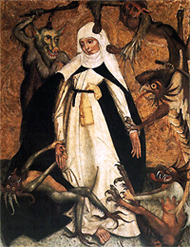I ran out of water the other day, and had to go back to the well to collect more. I hate having to go when the sun is at its highest; it is so much harder work to raise the water. The good thing is that when that happens, you can usually be certain that you won’t have to wait, as everyone else will have drawn enough water in the cool of the morning. So I was very surprised to find a man sitting beside the well under the shade of a tree, waiting. He wasn’t anyone I knew, but with his head covered, and his arrogant look, I knew him to be a Jew. I don’t know why they all look so arrogant. It is we Samaritans who are the true heirs of Abraham and Moses. While the Israelites were taken off to captivity in Babylon, and had their faith corrupted by their captors, we in Judah remained faithful, worshipping Yahweh on Mount Gerazim as he commanded. When the Jews came back from exile, they set up their centre of worship in Jerusalem, and now they tell us that we are not proper followers of Yahweh.
I guessed that this man wanted something and I was not wrong. He asked me for a drink of water. I was really surprised, as Jews don’t usually talk to Samaritans. Our leaders are very clear that we should not speak to Jews in case they corrupt us. I believe their leaders say the same about us. I asked the stranger what he thought that he was going to drink out of, as I had only brought a large water vessel to carry the water back in. He got a bit tetchy then; the sun must have got to him. He asked me whether I knew who he was. Well of course I didn’t. Then he said that if I had asked him for a drink, he would have given me water that would never end. I thought of all the thousands of jars of water that I have carried back to my house from the well, and got so annoyed that I asked him whether he thought that he was better than our forefather Jacob, whose well this was, and from which he himself drew water for his family and for his flocks. Jacob still had to draw water daily!
The stranger just smiled at me, and said that he knew water that would never end, and when people drank of it they would never get thirsty again. Thinking about all the hours spent at the well I asked him where I might get this living water from? His face took on a serious look, and he said ‘Go and call your husband and come back here with him.’ I paused for a moment, then told him the truth. ‘I don’t have a husband.’ He smiled at me again then ‘ You have told me the truth. You have had five husbands, but the man you are living with now is not your husband.’ It was as if someone had plunged a knife into my chest. He was right, but how did he know that, and what was I going to do about it?
He looked at me for a long while, and motioned me to sit on the edge of the well near to him. ‘You were married very young to your first husband. He died of a fever soon after your wedding. During the year he had spent building your home, you had got to know him well, and had come to love him. You were devastated when he died. Your Father wasn’t having you back at home again, so he rushed you in to marriage with a friend of his. It wasn’t a success, and he gave you a Get, a bill of divorce, after only a year. Your third husband you chose for yourself, but he could never live up to the memory of your first, dead husband, and he gave you a Get also after a few years. Your fifth husband was a lovely man, and your marriage was happy for many years. You had a child, a daughter, but when she was killed in a tragic accident, you blamed your husband, as she was with him at the time. He blamed himself, and the two of you grew apart. He presented you with a Get only a year ago.’



